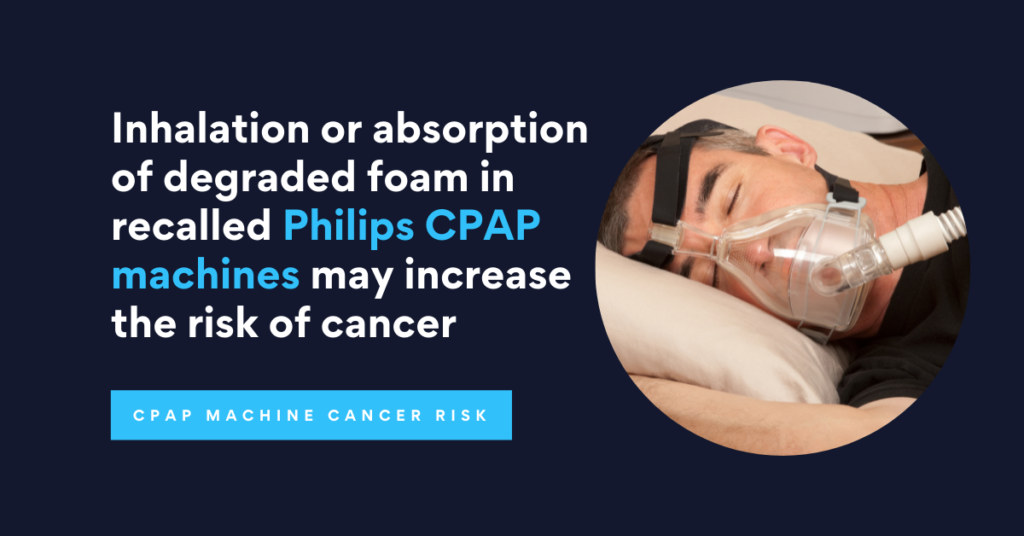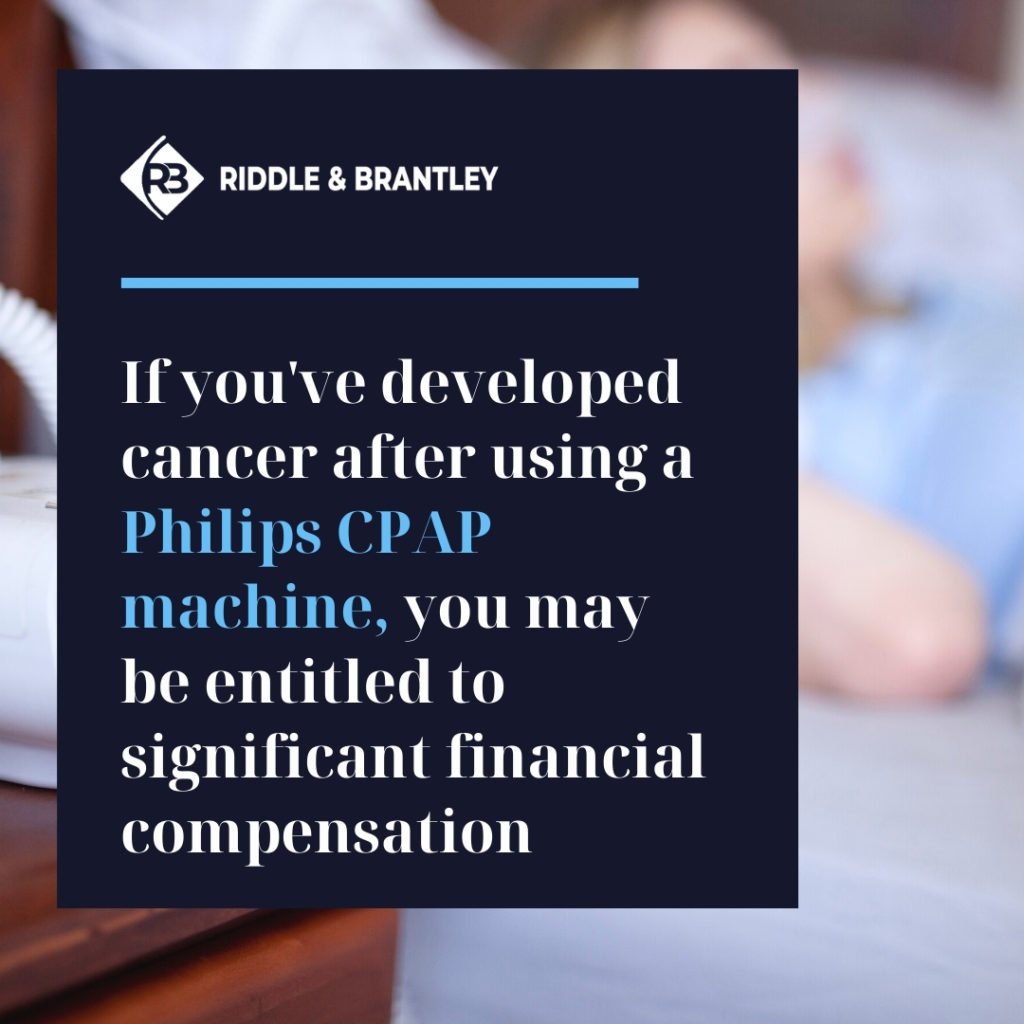Can CPAP Machines Cause Cancer?
Do CPAP Machines Increase the Risk of Cancer?
Philips has issued a recall of CPAP machines and mechanical ventilators due to a product defect that may increase the risk of cancer. CPAP machines are commonly used by sleep apnea patients throughout the United States and many are wondering, “Can CPAP machines cause cancer?”
 To be clear, Philips CPAP machines have been recalled due to a sound-dampening foam that, when degraded, may be inhaled or absorbed, potentially causing cancer and other injuries. Further investigation is warranted, but Philips CPAP machines may increase the risk of developing cancer, including liver cancer, kidney cancer, and lung cancer.
To be clear, Philips CPAP machines have been recalled due to a sound-dampening foam that, when degraded, may be inhaled or absorbed, potentially causing cancer and other injuries. Further investigation is warranted, but Philips CPAP machines may increase the risk of developing cancer, including liver cancer, kidney cancer, and lung cancer.
IMPORTANT: If you’ve used a recalled Philips CPAP machine, you may be at increased risk of developing cancer or suffering other injury. Talk with your doctor immediately about potential cancer risk and possible alternatives.
Our defective medical device attorneys are actively investigating claims that Philips CPAP machines and ventilators may cause cancer and other injuries, and we are ready to help however we can. We can evaluate your eligibility for a CPAP lawsuit with a free consultation.
IMPORTANT: Due to developments in the multi-district litigation, we can no longer accept kidney or liver cancer claims related to Philips CPAP machines. Other cancers and health problems may still qualify. Please call 1-888-652-6598 for a free case review.
For a FREE, no-obligation consultation with an experienced CPAP lawyer, please call 1-800-525-7111 or complete the fast and convenient form below.
The consultation is free, and we don’t get paid unless you do. If we don’t recover compensation for you, you won’t pay any attorney fees.
Call 1-800-525-7111 and let’s review your claim.
CPAP Machine Cancer Risk
In June 2020, Philips issued a voluntary recall of certain CPAP machines, BiLevel PAP machines, and mechanical ventilators, alerting consumers that a product defect may put users at increased risk of cancer and other injury.
According to Philips, a foam material used for sound dampening may degrade over time, and the resulting particulate may be inhaled, potentially causing inflammation and increasing the risk of cancer.
Cancers potentially caused by degrading foam and “off-gassing” in Philips CPAP machines include:
- Lung cancer
- Kidney cancer
- Liver cancer
- Rectal cancer
- Brain cancer
- Stomach cancer
- Testicular cancer
- Nasal cancer
- Throat cancer
- Laryngeal cancer
- Thryoid cancer
- Papillary cancer
- Various types of leukemia
- Non-Hodgkin’s lymphoma
- Multiple myeloma
NOTE: The potential danger that defective CPAP machines may cause cancer has not been extensively researched. We anticipate more studies to examine the possibility that defective CPAP machines can cause cancer, and will continue to provided up-to-date information as it becomes available. In the meantime, if you have used a Philips CPAP machine, talk with your doctor immediately about potential cancer risk.
Other injuries potentially caused by inhaling or absorbing foam particulates from Philips CPAP machines include:
- Respiratory problems, including:
- Reactive Airway Disease (RAD)
- Acute Respiratory Distress Syndrome (ARDS)
- Recurrent pneumonia
- New or or worsening asthma
- Lung damage / lung disease
- Kidney damage/ kidney disease
- Liver damage / liver disease
- Heart problems
- Sudden respiratory failure leading to heart attack
Symptoms of degraded foam exposure from Philips CPAP machines may include:
- Irritation to skin, eyes, and/or respiratory tract
- Breathing problems
- Inflammation
- Headache
- Dizziness
- Nausea
- Vomiting
- Hypersensitivity
- Asthma
“I’ve been diagnosed with cancer. Did my CPAP machine cause it?”
 CPAP machines recalled by Philips may cause cancer as a result of inhaled or absorbed foam particulates. If you’ve been diagnosed with cancer and believe that your Philips CPAP machine may have contributed to your disease, you may be eligible for a CPAP lawsuit.
CPAP machines recalled by Philips may cause cancer as a result of inhaled or absorbed foam particulates. If you’ve been diagnosed with cancer and believe that your Philips CPAP machine may have contributed to your disease, you may be eligible for a CPAP lawsuit.
Research is ongoing to determine exactly if and how CPAP machines cause cancer. Cancers that may be caused by defective CPAP machines include kidney cancer, liver cancer, and lung cancer.
For a FREE, no-obligation claim investigation concerning cancer potentially caused by a defective Philips CPAP machine, call 1-800-525-7111.
IMPORTANT: Due to developments in the multi-district litigation, we can no longer accept kidney or liver cancer claims related to Philips CPAP machines. Other cancers and health problems may still qualify. Please call 1-888-652-6598 for a free case review.
The consultation is free, there is no obligation, and we don’t get paid unless you do. There are no attorney fees unless we recover compensation for you in a CPAP lawsuit.
Call 1-800-525-7111 and let’s review your claim.
Why Choose Riddle & Brantley for Your CPAP Cancer Claim?
Since 1985, our defective medical device lawyers have been holding manufacturers accountable for negligence. If Philips CPAP machines cause cancer due to defective and failing foam, we are committed to holding the manufacturer accountable.
In more than 35 years serving victims of negligence, we’ve recovered millions of dollars in compensation for our deserving clients — including more than $600 million since 2000 alone (see disclaimer below).
“This settlement changed me and my family’s lives.”
–Linda B., Riddle & Brantley client
Don’t wait — proving that a recalled CPAP machine caused cancer may be difficult, and the longer you wait, the harder it may be to prove liability and win your case. You don’t have to go through this alone.
Call 1-800-525-7111 and let’s review your potential CPAP cancer claim today.
Justice Counts.
*** Disclaimer: The results mentioned are intended to illustrate the type of cases handled by the firm. These results do not guarantee a similar outcome, and they should not be construed to constitute a promise or guarantee of a particular result in any particular case. Every case is different, and the outcome of any case depends upon a variety of factors unique to that case.